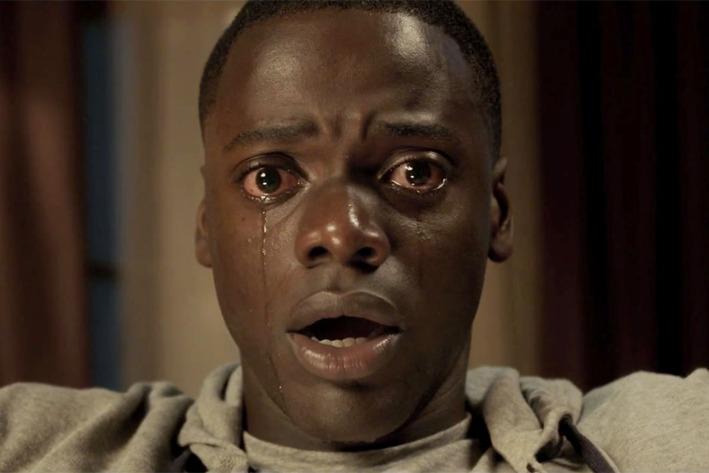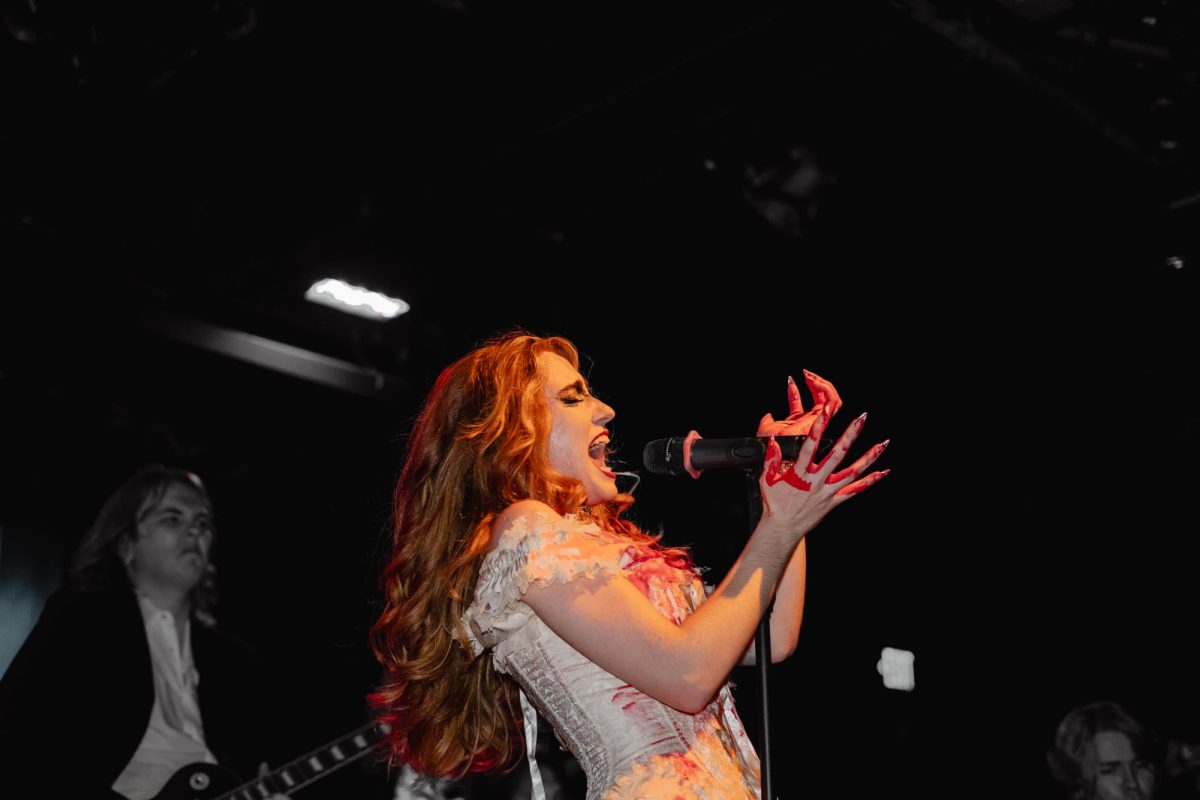For Black History Month, the Wellesley College Film Society, in collaboration with Harambee House, screened “Get Out” and “The Color of Friendship” last weekend, with a talkback hosted by Professor Kellie Jackson of Wellesley’s Africana Studies Department following the Friday screening of “Get Out.” Collins Cinema was nearly filled to the brim in support of Jordan Peele’s Academy Award-nominated film. Like many others in the theater, I was watching it for a second time. My familiarity with the narrative allowed me to think about the film in more depth and detail.
Warning: Spoilers for the film “Get Out” below.
Lots of fellow Wellesley students were doing the same. During the ensuing talkback, Tyanna Crump ’19 observed, regarding the demise of Rose (Alison Williams), one of the film’s antagonists, “It’s just like when [Chris’s] mom died. Only this time, leaving her there is the right thing to do.” Sabrina Cadiz ’20 mused, “Do you think Georgina (Betty Gabriel) was also opening the door? That her real self inside was doing all she could?” She was referring to the secret door to Rose’s stash of previous victims that was left mysteriously open for the protagonist, Chris (Daniel Kaluuya). Emily Lashelle ‘21, quipped that the ending “was like an ad for the TSA.”
Many first-time viewers found themselves surprised by the film’s ending. Marissa Okoli ’21 admitted, “I didn’t think that it was going to be a happy ending.” We are too used to the realities of innocent Black people being killed by the police to not tense up when the police car shows up at the end.
Another student, who prefers to be anonymous, was put off by the audience’s reactions throughout the film, saying, “I was wondering why people were laughing the the entire movie, because Jordan Peele said it wasn’t a comedy. It was supposed to send a message.” She was referring to Jordan Peele tweeting that “Get Out is a documentary” in response to “Get Out” being nominated for the Golden Globes under the “Comedy or Musical” section.
The talkback after the film was a wonderful opportunity to bring together everyone’s thoughts about one of the most discussed films of the past year. Professor Kellie Jackson, an Africana Studies professor who just joined the Wellesley faculty this year and teaches AfricanAmerican History from 1500 to Present, as well as a course on the depiction of slavery in film, led the discussion with enthusiasm and insight. In her powerful opening, she remarked, “Film is a tool. Film is a hammer. You can take a hammer and build, destroy, repair a house. It’s just a tool. It can be destructive, and productive.”
She went on to reflect, “In all horror films, there’s always a monster. It’s a symbol for what society is afraid of.” She observed the same audience reactions on which a student commented, pointing out, “It’s interesting that it wasn’t a comedy, but there was a lot of laughter. That concerns me. But sometimes laughter dispels those uncomfortable moments. . . There’s a running inside joke for black audience members. Jordan Peele is saying ‘I see you.’” It was reassuring to think of how communal “Get Out” is for Black people—how we can all point out those moments that put us at unease, as both the micro- and macro-aggressions unfold on screen. Yet it is also sad to think about how we can all relate to the casual racism we are so used to experiencing in our everyday lives.
Those microaggressions, and racial terrors, are all scary. Professor Jackson emphasized that “there is no scale when it comes to racism. Racism is destructive at level one and all levels.” Every racial injustice is harmful and painful and should not be watered down with qualifiers such as “well-meaning” or “not as bad as saying the n-word.”
I loved how Professor Jackson deconstructed the depiction of the toxicity of whiteness in the film. “All white people are Rose,” she commented. “You think she’s woke, but she just didn’t want a paper trail [with the police]. It’s all an act. In the last scenes, she’s really checked out. It is very symbolic. A majority of white people… refuse to recognize or relinquish white privilege.” She then addressed the white people in the audience: “Is it terrifying for you the way it was terrifying for me?… the privilege of whiteness is you don’t have to worry. It’s not your lived experience.”
Reflecting on the metaphor of the Sunken Place, which was a dark, frozen place to which Chris goes when hypnotized, Professor Jackson posited, “The Sunken Place is representative of this place where POC go to refute their blackness and escape the reality of anti-blackness. It is a psychological space where you are trapped—a defense mechanism to antiblackness.”
Professor Jackson discussed how the film depicted the TSA in a more positive light than usual—Chris’s friend, who ultimately saves the day, is a TSA agent. “NPR was doing a study about how the TSA love ‘Get Out.’ It was the first film where they saw themselves as not a joke, but critically thinking. TSA is [typically] not seen as legitimate, not seen as the real authority. Yet the TSA is the most vulnerable in government shutdowns— must show up to work without pay.”
Professor Jackson’s comments provided plenty of food for thought. “Racism is not always about being intensely hated,” she said at one point, “but also about being obscenely loved.” And that’s what it means to see racism as pornography, as cultural appropriation.
Professor Jackson astutely pointed out that, “‘Get Out’ is about the occupation of Black bodies,” inspiring one student in the audience to realize that the reason the Armitage family was so against Chris’s smoking was “just to preserve his body.”
Jackson also brought up a powerful quote from actor and activist Jesse Williams: “Just because [Black people] are magic, doesn’t mean we’re not real.”
Wellesley students offered their own observations of race and racism in the film. One student spoke on the symbol of the lone Asian character in the film, noting, “It was really interesting to see the Asian man in the film. There is a lot of anti-Blackness in Asian communities: fake niceness but talking behind people’s backs in native languages.”
Professor Jackson’s responded, “The Asian man is representing the model minority, susceptible to white society, not questioned by the group in the ways that Black people are questioned. Chris doesn’t come up to the Asian man like he did to Logan [the other Black man at the gathering].”
She also discussed Rose’s grandfather‘s resentment over losing to Jesse Owens. “Black excellence is so much the exception and not the rule, and the resentment is always there for the exception in the excellence, no matter how limited, as though there’s not enough to go around,” she explained.
The many slave metaphors in the film were also discussed. Some were obvious—Chris picking cotton, for example—while others were more subtle, such as the killing of the deer, with “buck” having been a name used to refer to Black male slaves.
However, at least some viewers felt that the film floundered in its representation of Black women. Tyanna Crump ’19 critiqued, “The first black character that was a woman in the film was a stereotype of someone who was unprofessional and didn’t take her job seriously.”
All in all, it was a very fulfilling dialogue, cementing “Get Out” as one of the greatest filmmaking projects of 2017.




